The onset of the COVID-19 pandemic two years ago really brought home to us the importance of maintaining and improving our health – both inside and out.
Maintaining our physical health could mean the difference between a mild or a severe case of covid, and the impact of multiple lockdowns, separation from our loved ones, and working from home, all took their toll on our mental health, too.
Combined with the distressing and upsetting news coming out of Ukraine on an almost daily basis, it does seem a challenge to keep ourselves upbeat and positive.
As a responsible employer, KOREC understands the importance of ensuring a happy, healthy and supported workforce – and takes action to ensure it.
To mark this International Day of Happiness, here’s just some of the initiatives we’re undertaking to bolster the health, happiness and prosperity of our people;
Perks of the Job
The company now proudly boasts 5 physical first aiders, including Steven Sreeves who just completed his Emergency First Aid at Work training, provided by St John Ambulance
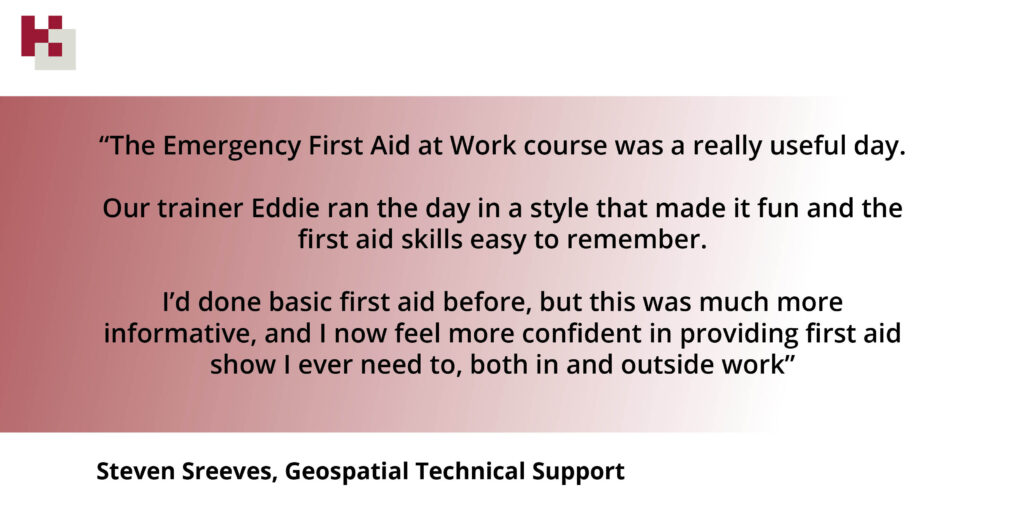
- We’re also proud to have two mental health first aiders, in the shape of Rachel Caddick and Stuart Guthrie-Cadge, both of whom recently completed the Mental Health First Aid England course.
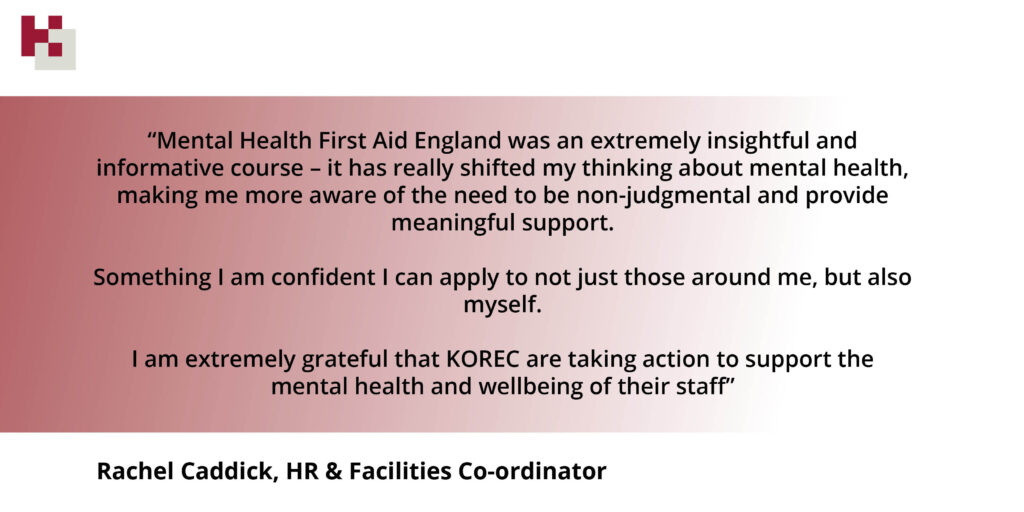
- Rachel and Stuart recently held a Lunch ‘n’ Learn on the difficult but important subject of depression, anxiety and suicide – and offered advice and tips for those who may be struggling.
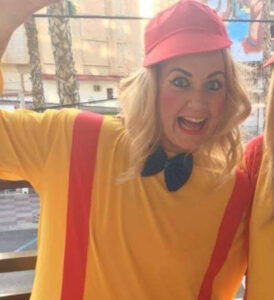
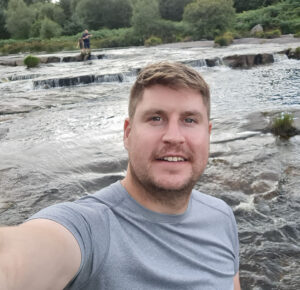
Meet the KOREC mental health first aiders! Rachel Caddick and Stuart Guthrie-Cadge
- We’ve signed up to Plumm – a dedicated online platform that offers free and confidential chat therapy, online courses and meditation
- We recognise the importance of small gestures, which is why we send every single employee a small Valentine’s gift each year, just to let them know we appreciate them.
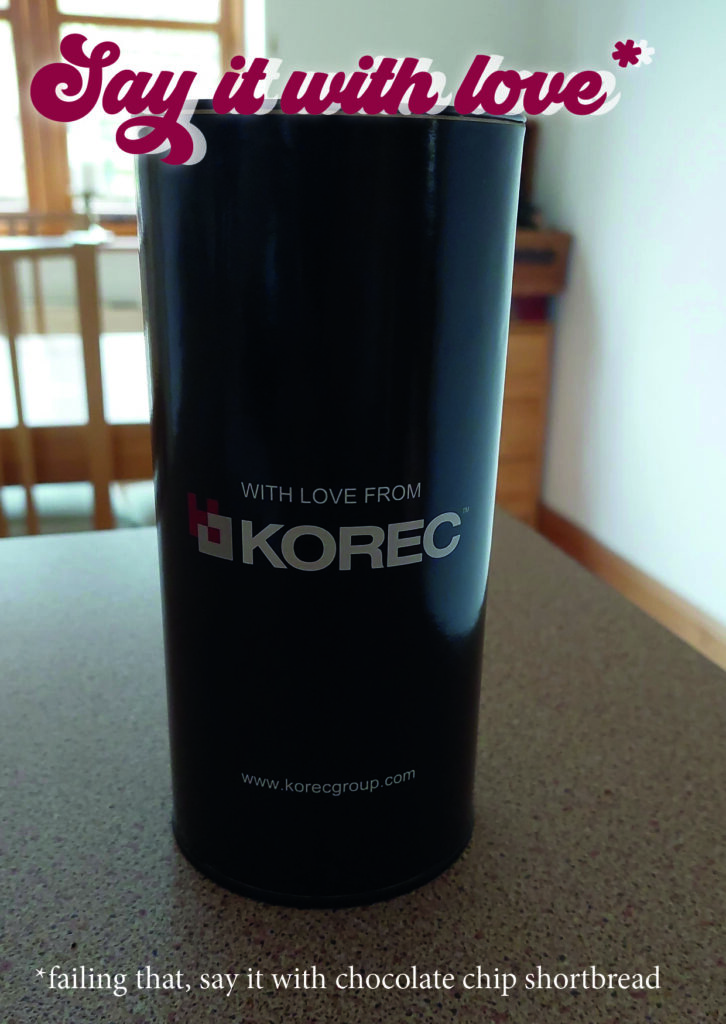
- Speaking of small gestures, who doesn’t love a wee perk? For a few years now KOREC has invested in Perkbox, an online portal chock full of freebies and discounts on everything from free cinema tickets to cheaper gym discounts. This also includes access to the Employee Assistance Program – providing 24/7 support for those struggling with legal issues, debt, anxiety, bereavement or relationship issues.
- We also love to party! Which is why we have not one, but two KOREC parties – a summer and a Christmas event! The KOREC gang love nothing more than getting together and having a knees up. During COVID, we thought this was more important than ever, so we held our first ever ‘virtual’ Christmas party, and smaller, socially-distanced summer events.
On this International Day of Happiness, why not take a few moments out of your day to do something that makes you feel good?
Wishing you health, happiness and prosperity – from the whole KOREC team!
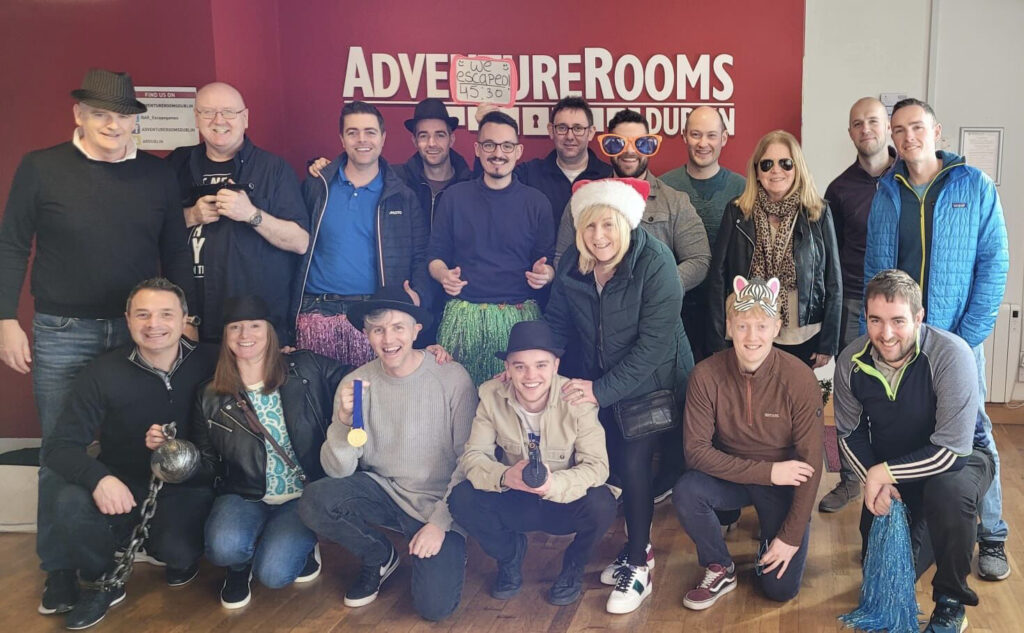
1st February 2022 marks the beginning of the Chinese New Year. Three days later, on Friday 4th, the Beijing Winter Olympics begin.
To mark these two occasions, and because we are mad for a group fitness challenge (or just plain mad?) the KOREC team are committing to undertake a mammoth journey.
In February 2021, our UK and Irish teams undertook their ‘Fit4Feb’ challenges – traversing Europe and America (virtually, of course…), and totting up an impressive 6,200km between them.
This year, in the spirit of the Chinese New Year – the year of the Tiger – we’ve committed ourselves to an even bigger challenge.
We are going to walk, run, swim, cycle and hop our way back from Beijing to London – a distance of a whopping 10,681km!
The well-known quote ‘a journey of a thousand miles’ is attributed to the Chinese philosopher Lao Tzu, and seems particularly apt for the challenge that lies ahead – at first, a journey of over 6,000 miles seems impossible – but all we can do is take that vital first step and begin our journey – and crucially – we’re not alone!
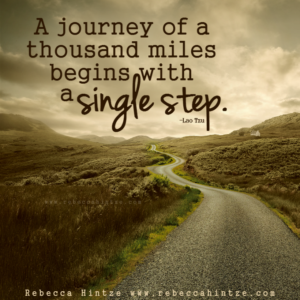

The Year of the Tiger
Since 2022 marks the year of the tiger, we’ve taken some inspiration from our furry friend. According to the Chinese Zodiac, the tiger is the ‘king of all beasts’, and is a symbol of Bravery, Competitiveness, Unpredictability and Confidence – some familiar traits we can see in ourselves!
So we’ve set some mini challenges based on these qualities, with some awesome (tiger-themed) prizes up for grabs!
BRAVE
- Who is brave enough to join our challenge?
- Who will brave dark and dismal early mornings for an invigorating run?
- And most importantly, who is brave enough to share their most embarrassing workout outfit?!
COMPETITIVE
- Who will get the most miles under their belt?
- Who can most accurately guess where we’ll end up come 28th February?
UNPREDICTABLE
- What will we discover en route?
- Who will come up with the most wacky method of exercise?
CONFIDENT
- Who actually thinks we can go the distance?
- Who’s willing to give it a go anyway?


We hit the ground running on February 1st, and we’ll be providing regular weekly updates on our progress throughout the month via our social channels.
Wish us luck, or as the Chinese say – Zhù nǐ hǎo yùn!
Our third ‘Hidden Figure’ of October was a true pioneer in not one but two fields – the football pitch and the fields of war – and has just entered the Hall of Fame at the National Football Museum
Walter Tull seemed to face adversity at every step of his short but eventful life. Walter, along with his brother Edward, was left orphaned at just nine years of age after his mother died of breast cancer and his father of a heart attack. The two young boys were moved from their native Folkstone to a children’s home in Bethnal Green.
It was here that Walter’s love and talent for the beautiful game first became apparent, and at the age of 20 he was signed for local amateur club Clapton FC – one of the first black players in English football. Reports were Walter never played a losing game, and was called the “catch of the season” by the Football Star.
Fame came calling just a year later when Walter signed for Tottenham as inside forward. During his short time with the club, Walter endured horrific racial abuse at the hands of the opposing fans. Newspaper reports of the time state that, despite being abused with language “lower than Billingsgate [market]”, Walter remained, at all times, a true professional;
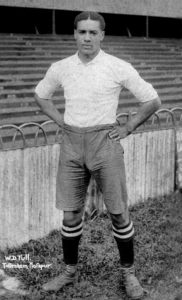
“He is Hotspur’s most brainy forward … so clean in mind and method as to be a model for all white men who play football … Tull was the best forward on the field.”
Walter’s life took a very different turn with the outbreak of the Great war in 1914. He wasted little time in enlisting, joining the ‘Footballer’s Battalion’ (what else?) of the Middlesex Regiment in December 1914. He fought extensively in the war including on the Italian and Western fronts, and at the battle of the Somme. His “gallantry and coolness” helped him climb the ranks, becoming a second lieutenant in 1917 – one of the first mixed-heritage men to become an officer in the British Army, and the first black man to command white troops.
Walter’s life was cut tragically short on 25th March 1918 in northern France, during a German offensive. He was just 29 years old. When notifying of his death, his commanding officer recommended Walter for a Military Cross – for his gallantry and brave service.
Despite never receiving the award he clearly deserved, today Walter has been recognised for his contribution to the beautiful game. This week he was posthumously entered into football’s Hall of Fame, in a ceremony at the National Football Museum, Manchester.
Former Tottenham defender Ledley King, who was at the ceremony, described Walter as a “true inspiration – to me and for every black footballer who has come through since”
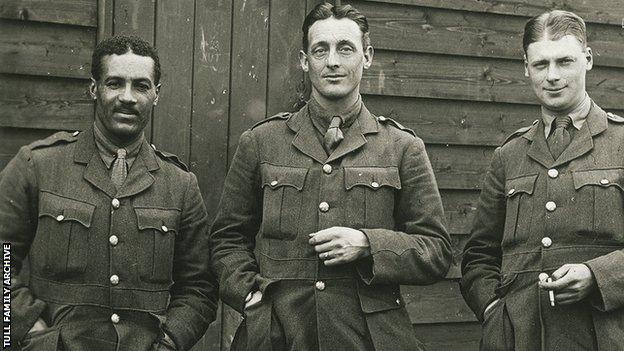
Sources for this blog;
https://www.bbc.co.uk/sport/football/43504448
https://www.bbc.co.uk/sport/football/58992003
https://en.wikipedia.org/wiki/Walter_Tull
Marking the second in our ‘Hidden Figures’ series is a look at the woman who has just topped the 2022 Powerlist – Microsoft CDO Jacky Wright
First published in 2007, The Powerlist is a list of the top 100 most influential people of African or African Caribbean heritage working in the UK. Famous recent winners have included the author Malorie Blackman, Brexit activist Gina Miller, and last year’s winner, Formula 1 driver Sir Lewis Hamilton.
2022’s winner is admittedly less of a household name – Microsoft Chief Digital Officer Jacky Wright.
We did a little research to find out more about Jacky and her background – and how she explains her business philosophy in her own words.
Jacky was born in Jamaica, her parents part of the Windrush generation that came to the UK in search of a better quality of life for their families. Her father served in the Royal Air Force and distilled in Jacky the belief that, through striving and hard work, she could truly be and do anything she wished.
Hear Jacky in her own words in this BBC interview:
Jacky has spent much of her working life in the US, with senior positions at major multinationals such as BP, General Electric and Anderson Consulting. But she returned to the UK in 2017 for a two-year stint overseeing the transformation of HMRC to a truly modern, digital organisation.
Clearly, Jacky does not shy away from a challenge. The ongoing transformation of the UK’s tax body is fundamental shift – involving the relocation of 65,000+ employees into 13 regional UK hubs by 2025.
At the same time, the government had set itself the challenge of becoming the UK’s most diverse employer by 2020. For Jacky, these two challenges, at first seemingly separate, are at the heart one and the same.
“Becoming a more diverse environment is not just about making government a better workplace. It is also about enabling government to work better: you can more effectively serve the breadth of the citizenry if your workforce is composed of a similarly broad cross-section”
For Jacky, if organisations such as HMRC are to truly modernise, decentralise and better reflect contemporary working practices, it is vital that the people making the decisions best represent UK society as a whole.
“I want my team to be an inclusive team from all walks of life, because then we can best address problems. Diversity informs me like it should inform anything that anyone does…We’ve got to understand the citizens, because we have to make sure they are able to interact with us – no matter who they are, what walks of life they are from, or whether they have disabilities. And, in order to do that, I’ve got to think broadly.”
We think we can learn a lot from Jacky’s ethos, in how we continue to build modern, forward-thinking and inclusive organisations.
Congratulations to Jacky on topping the Powerlist – we don’t think we’ve heard the last of her!
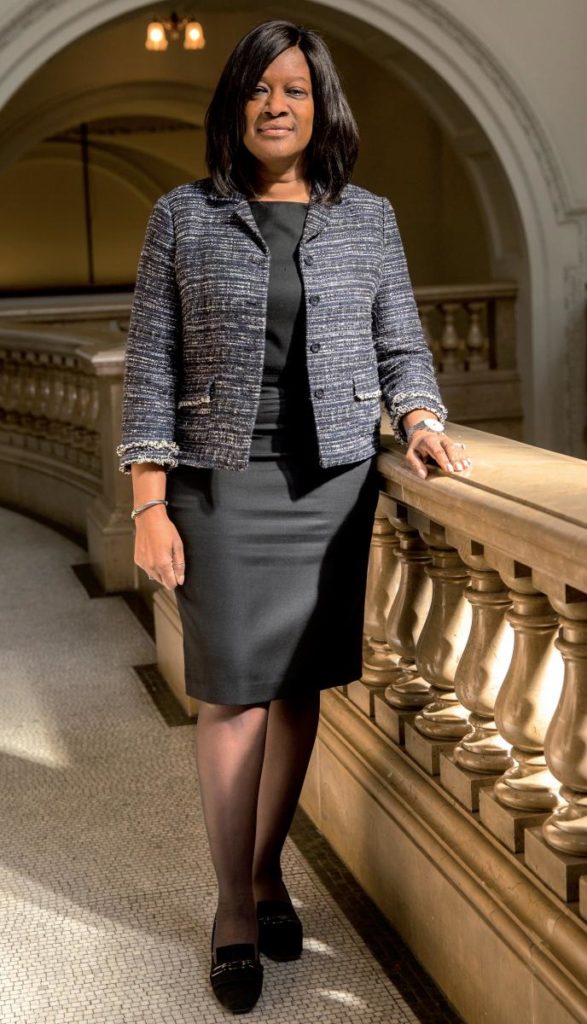
Sources for this blog;
https://www.bbc.co.uk/news/av/business-58890913
It’s a topic of great concern to many in our industry – how do we attract the next generation of geospatial professionals?
It’s also a question that we’ve addressed in a column for GeoConnexion magazine based on the experiences of KOREC Director, Mark Poveda, who recently returned to his Dublin College with two colleagues to talk to final year students studying Geospatial/Surveying. However, college students are already engaged with our industry having actively chosen a relevant course and maybe we should be talking to students earlier.
A visit with value
For KOREC Operations Technical Support, Liam Hartley, the 450th Anniversary of his old school, Queen Elizabeth’s Grammar School, Horncastle (QEGS), set him thinking as to what sort of career information he’d have valued as a sixth former living in a rural part of the country just starting to consider future job prospects, apprenticeships, or degree courses.
As a QEGS alumni, he’d seen invites to assist students in CV preparation or interview techniques but felt that this could be the perfect opportunity to offer some time to share his thoughts on geospatial careers with an age group just starting to think about their own futures.
At the invitation of the school’s careers lead, Sarah Holmes, Liam was able to spend a couple of days at the school chatting about the geospatial industry to teachers and students alike.
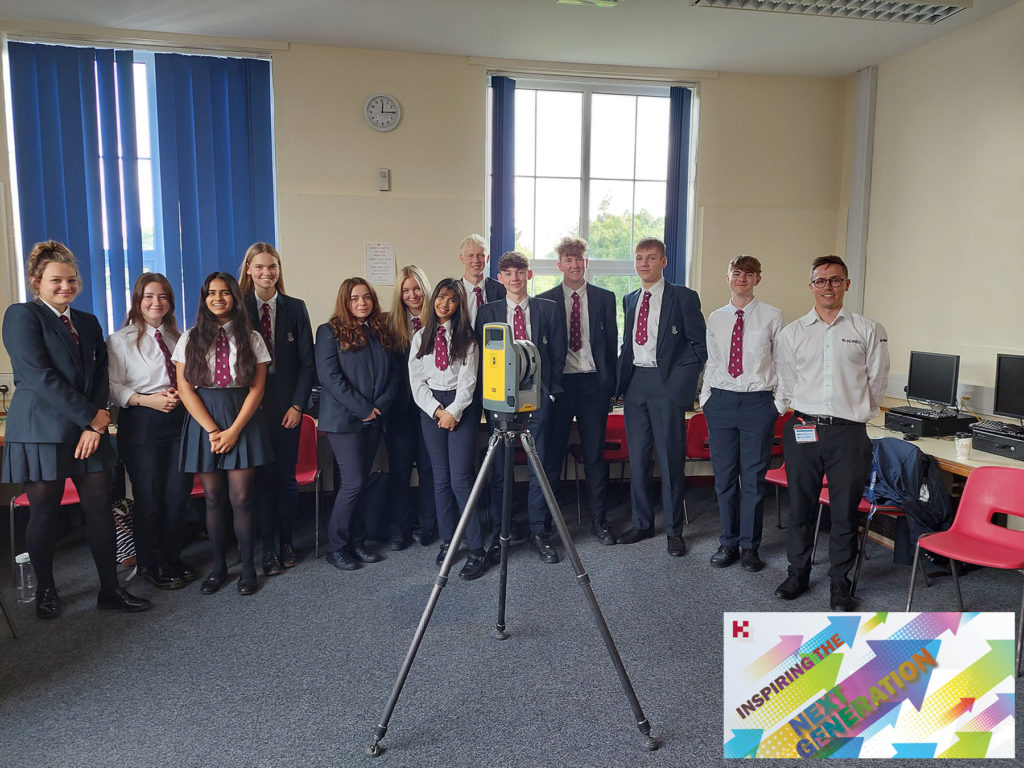
Great technology and engaging examples
Equipped with a Trimble X7 3D Laser Scanner and plenty of examples of what our industry has to offer, Liam reports that he spent a very rewarding 50 minute Development Class with the mixed group of students. Drawing on relevant examples such as 3D data (used in the gaming and film world) he outlined how F1 tracks are surveyed with Mobile Mapping, how sports events measure distance with total stations, how music festivals are set out with GPS mapping systems and how spatial data is everywhere and in everything we do, from using Google Maps to creating smart cities.
Liam feels that at least three quarters of the class seemed very engaged with four or five particularly responsive to the geospatial world. He reports, “I had a really rewarding two days at QEGS sharing my enthusiasm for an industry that has so much to offer as a career. Interestingly, very few of the students were familiar with the term ‘geospatial’ and of course, this highlights the problem we have in promoting a career where our key audience has very little understanding of what we do. If we’re to overcome this, then it’s vital that we are actively promoting our industry to this age group. Here at KOREC, we want to be a supplier that does just that and we’re perfectly positioned to do so from a unique perspective because we see everything that the industry has to offer technology wise. I very much want us to step forward and lead from the front.”
What next?
Liam used his two days at QEGS to plan for a future event for next year that he hopes can be rolled out to similar age groups in different schools. Watch this space!
To learn about KOREC’s Next Generation initiative (aiming to encourage a new generation to the geospatial industry) please contact marketing@korecgroup.com
Got a question? Want to find out more about the X7? Why not submit an inquiry with our friendly team?
The 1960 Rome Olympics introduced the world to a boxing superstar named Cassius Clay, better known perhaps as Muhammad Ali. But it’s a lesser known gold medal winner from that games who’s the star of our first ‘Hidden Figures’
Wilma Rudolph took home no less than 3 gold medals for athletics in 1960, namely the 100m, 200m and 4 x100m relay. An impressive feat in itself, but even more impressive when you understand Wilma’s background.
The twentieth of 22 siblings, Wilma was born in 1940 in Clarksville, Tennessee. She was born premature, weighing just 4.5 pounds. She suffered from multiple illnesses in her childhood, including pneumonia, scarlet fever and polio – which left her lame in her left leg and foot. Medical care for African-Americans was in short supply in Clarkesville, so Wilma and her mother Blanche were forced to make a weekly bus journey some 50 miles to the largely-black medical centre in Nashville, for treatment. This continued for 2 long years, until Wilma regained the use of her leg, by the time she was 12 years old.
Wilma’s athletic talents were spotted at high school, where she soon earned the nickname ‘Skeeter’ due to her speed. At the tender age of 16, and the youngest member of the squad, Wilma travelled across the globe to the Melbourne Summer Olympics, where she brought home bronze in the 4 x 100m relay.
Four years later in Rome, Wilma competed in 3 events, winning gold in all 3 – becoming the first American woman to win three golds in a single Olympics. In sometimes scorching temperatures of 110F (43C), Wilma was inspired by another American sprinter – Jesse Owens, her inspiration from the infamous 1936 games in Berlin.
Whilst her victories had her cast as America’s ‘leading lady’, Wilma returned home to a very divided nation. When Clarksville celebrated ‘Welcome Wilma Day’ to celebrate her achievements, Wilma used her new-found fame to insist that the event be fully integrated between black and white people – the first fully integrated event in the city’s history.
Wilma retired from running age 22, feeling she had reached the heights of her Olympic career. In her own words; “I’ll stick with the glory I’ve already won, like Jesse Owens did in 1936”
Perhaps Wilma thought her fame was required elsewhere. As well as gaining a degree in education in 1963, Wilma spent over a month in west Africa as a US goodwill ambassador. On her return, she took part in a civil rights protest in Clarkesville to desegregate the city’s restaurants. Within weeks, all of the city’s restaurants, as well as public facilities, became fully integrated between black and white people.
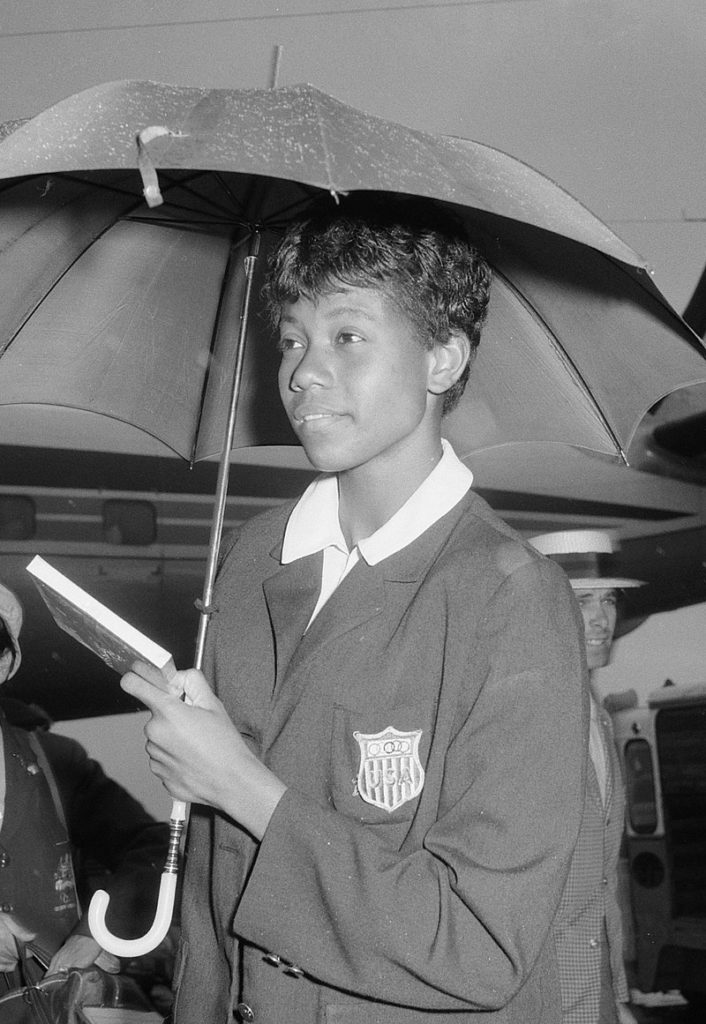
No doubt the childhood memory of those weekly 50 mile bus rides to a ‘black’ hospital were high in Wilma’s mind – with a determination that no other young black child would have to endure the same hardships.
October in the UK marks Black History Month, and for the second year, here at KOREC we are taking part.
Last year, we asked our people to tell us who had inspired them, or left a positive impact on their life. As well as some personal connections, some notable names such as Nelson Mandela and Barack Obama were cited as inspirational figures.
As a contrast, this year, we are taking our lead from these quotations from BHM editor Catherine Ross, and Minister of State for Equalities, Kemi Badenoch;
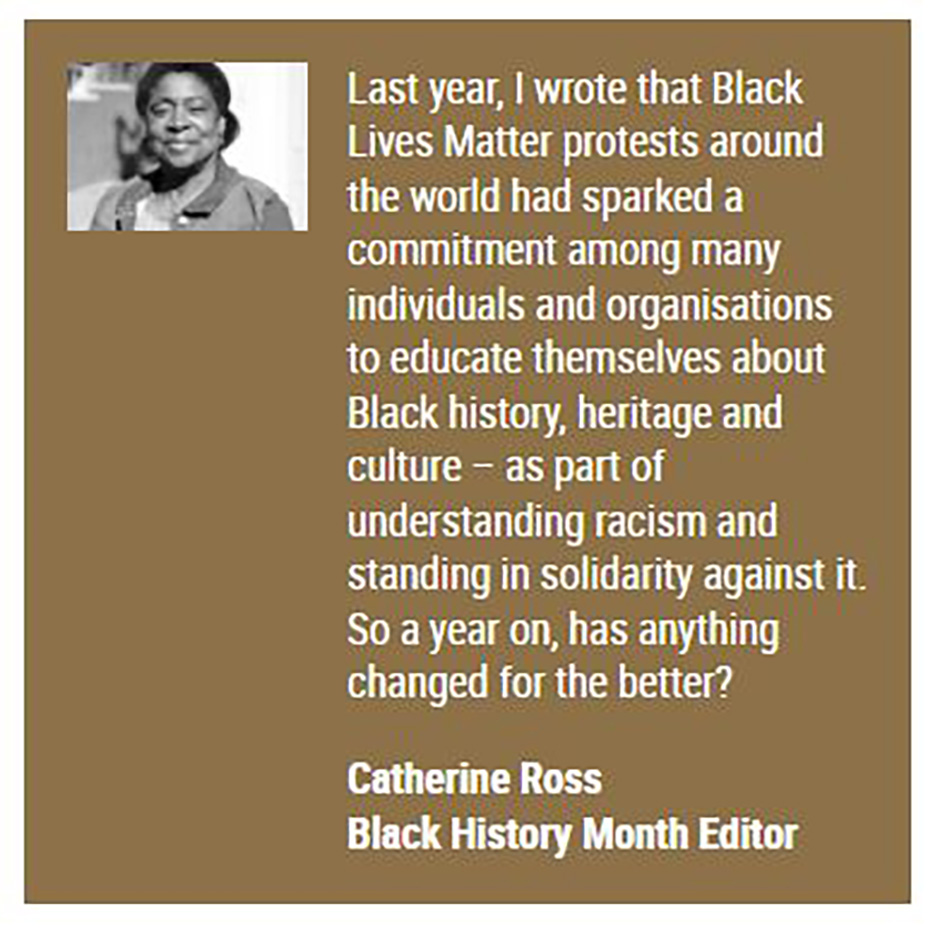
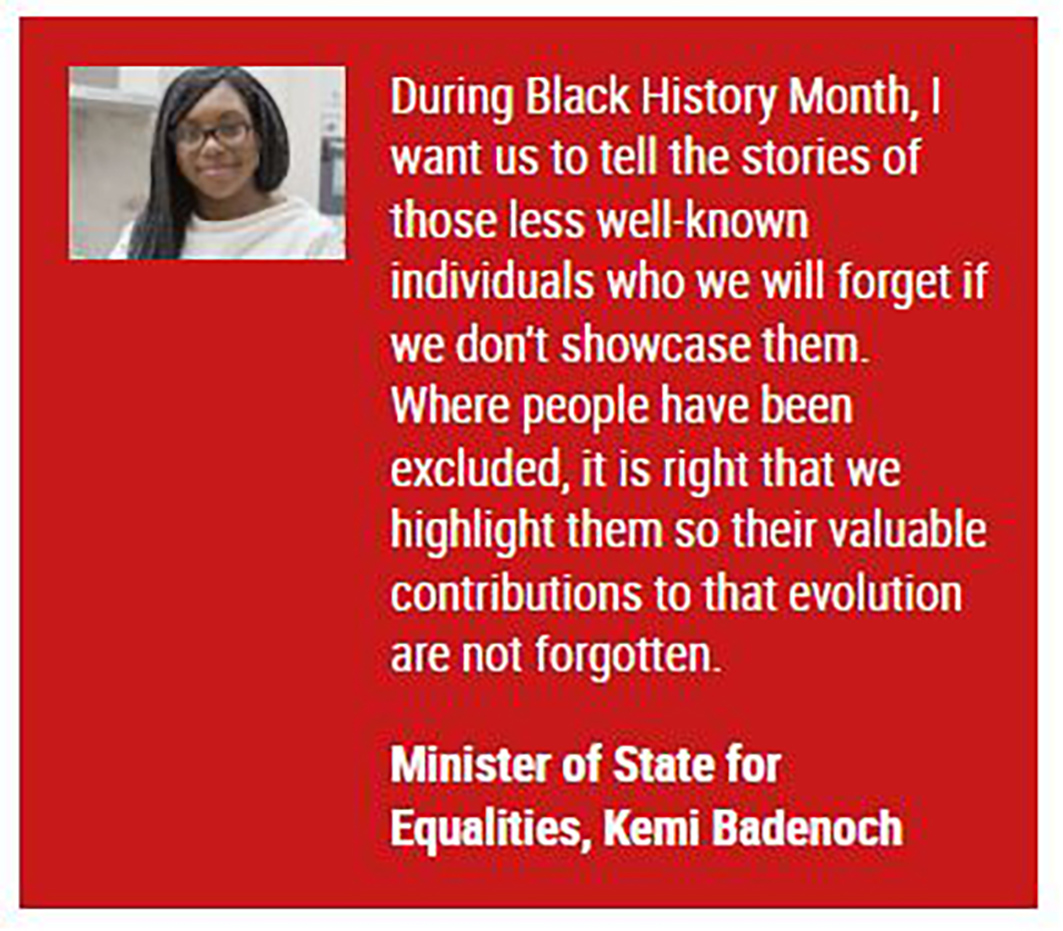
“Because black history is British history“
Dawn Butler MP (first female African-Caribbean minister to speak at the dispatch box)
Hidden Figures
Throughout the month, we’ll be focussing on some lesser known black figures from throughout history. The aim is to not only highlight people who have changed the course of history, but to educate ourselves on who these people were, the times they lived in, the challenges they faced – and the contributions they made to society.
So instead of familiar names, we’ll be talking about some lesser known (or even hidden) figures from throughout history – so if the names Wilma Rudolph, Ignatius Sancho, Mary Seacole, Harriet Tubman or Katherine Johnson don’t mean much right now, we hope that come October 31st we’ll all have learnt a little more.
After all, as this timeline shows – the black history of Britain is far from recent…

Sometimes in life, things just fall into place, the stars seem to align, and all is good in the world. Take last week as an example – Tuesday marked the return of The Great British Bake Off to our screens, and the annual MacMillan Coffee Morning took place on Friday. Pure perfection, right?
We chose to celebrate in style and mark the occasion by hosting our very own ‘Bake Off’ – After all, there’s nothing we like more than a bit of healthy competition. Our Liverpool office was up first, hosting their coffee morning on Thursday.
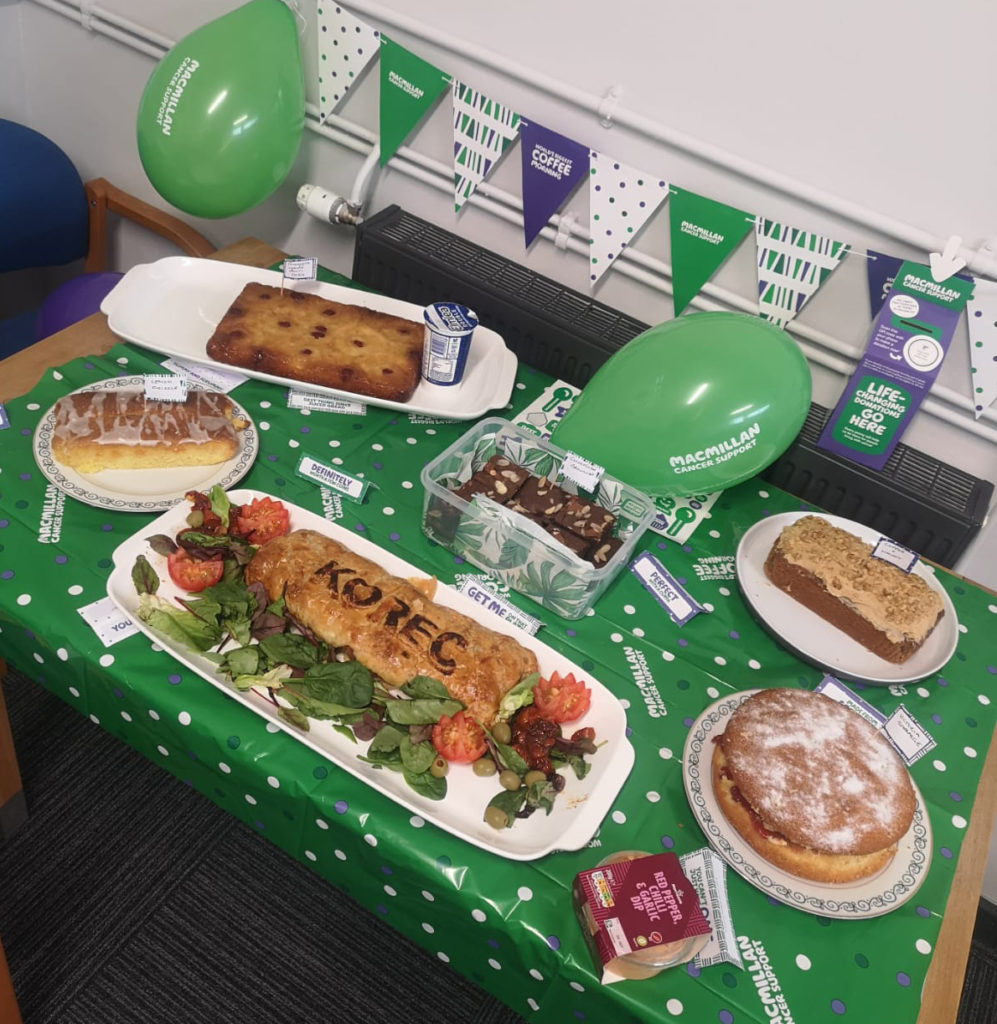
Steve, Karen and Lorna treated us to an array of goodies including a pineapple upside-down cake, coffee and walnut, and a classic Victoria sponge. But it was Patsy who really stole the show with her branded (!) KOREC sausage roll.
So the pressure was really on for team Huntingdon come Friday, but they had a secret weapon in the form of Lloyd “Hollywood” Wilkinson – our very own cake judger!
As the photos attest, the turnout was great, and the quality of bakes was very high. Lloyd had a very challenging time taste-testing all of the treats, but eventually the winner was crowned – congrats to Laura, who was awarded with a beautiful Tiara for her efforts!!
Most importantly, besides the joy of getting together again and enjoying some lovely home-baking, our teams raised over £230 in funds – matched by KOREC, that’s £460 to help fund the vital work of MacMillan nurses. Now that’s something truly worth celebrating.
A huge thank you to all our wonderful colleagues who baked, ate, and raised cash!
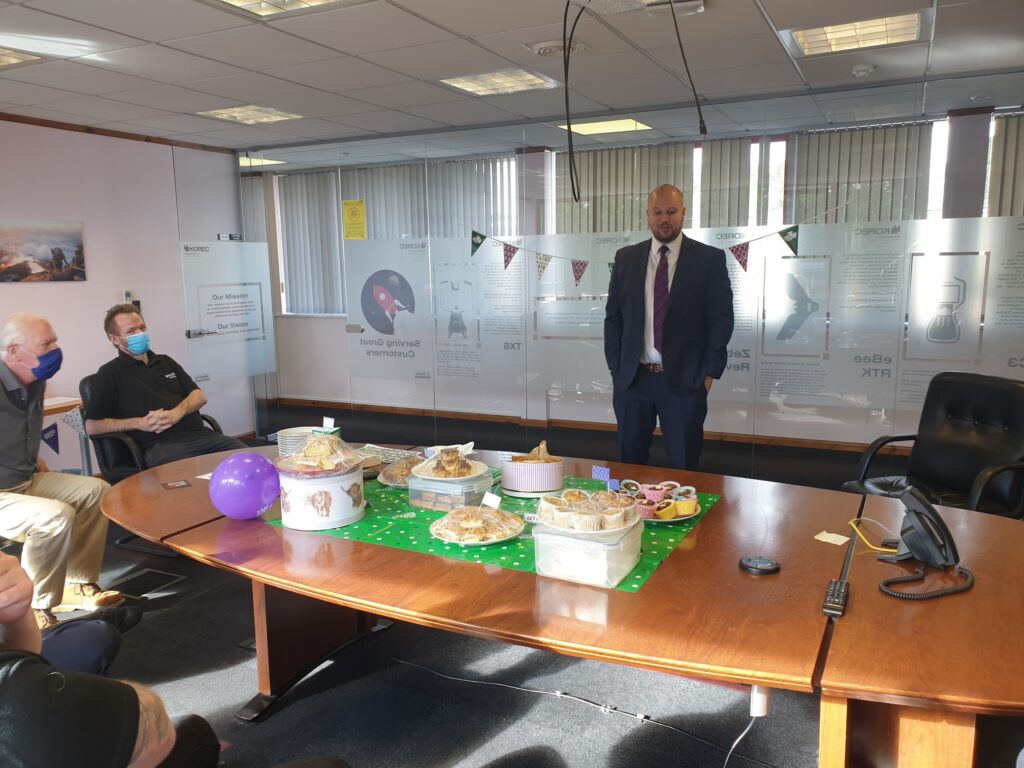
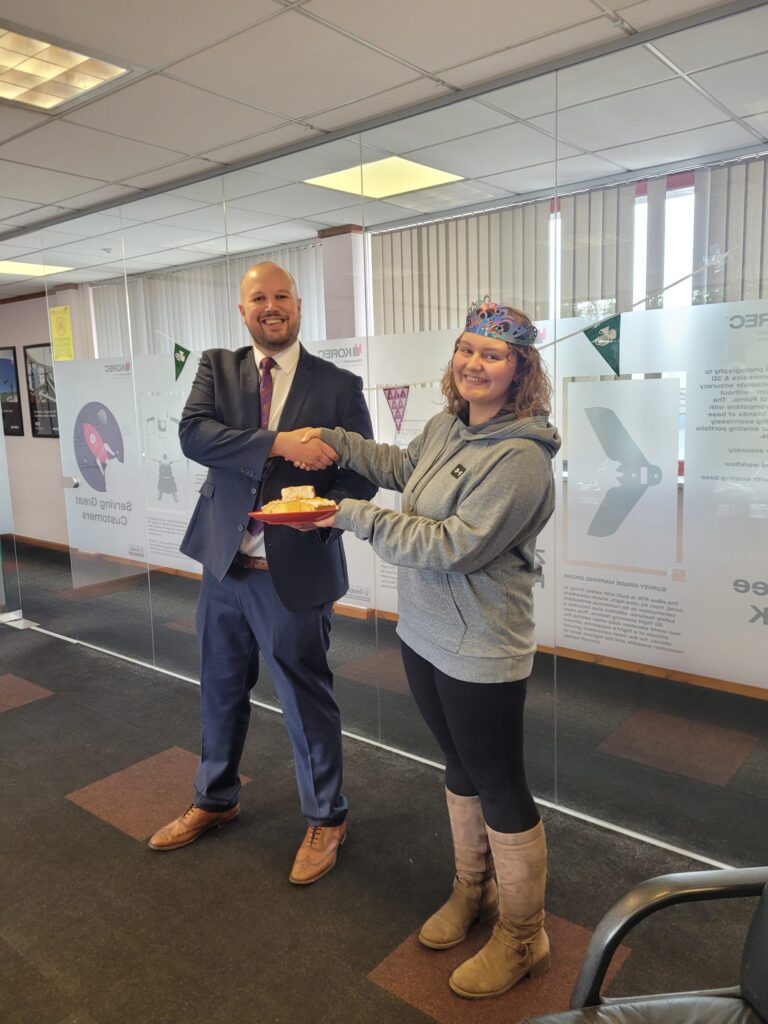
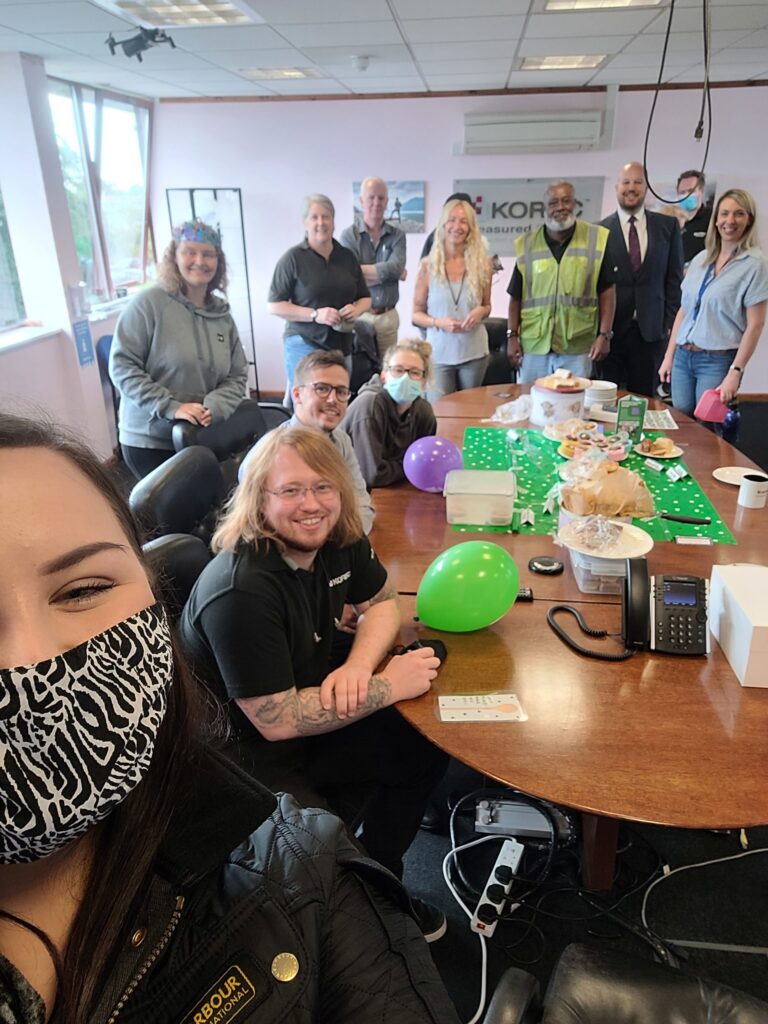
In an ever-evolving industry, KOREC are proud of our diverse workforce containing a mix of long serving employees and steady growth year on year which brings in new people and new ideas to our business. With over 60% of our people being with us for over 5 years (a significant few with double decade service!) KOREC is a place to develop a sustainable and varied career.
Always looking to enhance our employee experience; we recently introduced annual leave enhancements to reward long service with additional leave up to 30 days (plus Bank Holidays). We also offer a generous and comprehensive employee benefits package including access to the Perkbox platform offering hundreds of freebies, discounts and wellness initiatives, corporate Virgin Media discounts, a Cycle to Work scheme and a Technology purchase scheme. These benefits are continually added to and an upcoming addition will be offering access to our corporate car purchasing power for personal vehicle leasing via our fleet provider Lex Autolease.
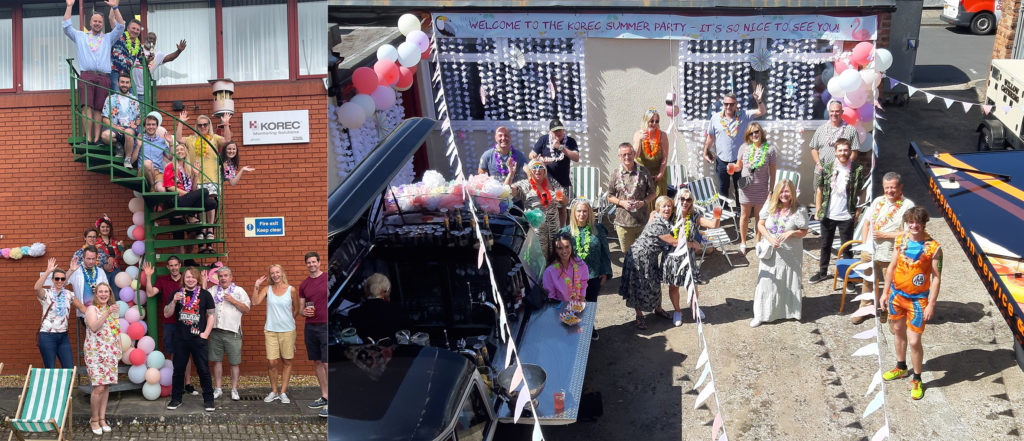
Another significant enhancement launching this month is our partnership with the Healing Clouds platform. KOREC have long been aware that looking after the emotional wellbeing of our people is hugely important; never more so than now with the added stresses of the COVID pandemic. Our Perkbox offering already provides Employee Assistance Programmes, and many other mental health and wellbeing resources which will be complemented by the access to focused online therapy sessions and many other resources provided by Healing Clouds.
Along with our detailed tailored induction programmes and ongoing training and development across all areas of our business, we feel the benefits we offer at KOREC provide a great opportunity to join a growing business at a time when technology is developing fast and we are providing great solutions and services to our customers.
Find Out More;
- Read some of our other employees views on working for KOREC here https://www.korecgroup.com/staff-testimonials/
- We have a few opportunities currently available which can be found here https://www.korecgroup.com/careers/
Watch what our recent joiners have to say about joining KOREC;
How KOREC are powering a Guinness World Record breaking attempt
Ian Williams is a man on a mission. Over the weekend of 7-8th August, he’ll be attempting to smash the Guinness World Record for the furthest distance travelled in a go kart in 24 hours, at the Teesside Autodrome British 24hr Challenge.
The current record stands at 945 miles, while Ian hopes to smash through the 1,000 mile (1600km) barrier – as well as raising £15,000 for charity in the process.
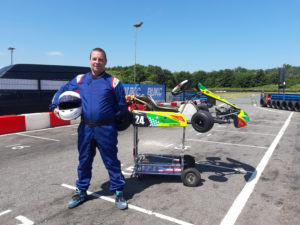
So how do you go about planning such an exhausting mission? Well first things first, Ian (not to mention Guinness) needed to know the precise distance of the track to be driven – which is where KOREC come in.
Whilst the official track length is stated as 2.1km, Ian needed a precise measurement – both to satisfy the stringent demands of Guinness, and to pace his race.
Ian searched around local survey companies before he was advised that KOREC might be able to assist with obtaining an accurate track measurement. Never ones to shy away from a challenge, we immediately knew this was a job for the MX9 and the Professional Services team.
Flash forward to 1st July, and our team met with Ian trackside. It took a matter of minutes to drive the race-day circuit layout in the MX9 scanning vehicle, capturing millions of measurements of data points of both track position, and elevation.
The data was processed back in the office, producing a dense 3D point cloud of the circuit, allowing for a centre-line to be produced – which came in at 1.64km in distance – almost half a kilometre shorter than the stated distance.
0.5km may not seem much to you or me, but when you’re planning to drive over 1000 miles, it works out at an additional 214 laps of the circuit – knowledge that means the difference between success and failure.
As well as providing these crucial measurements, the Professional Services team have generated beautiful 3D visualisations of the circuit, which have been incorporated into Ian’s marketing video – a vital piece of promotion for his charity drive.
Ian is hoping that his record attempt will raise £5000 each for his three chosen charities – Shelter, Papyrus (prevention of young suicide) and the Lincolnshire and Nottinghamshire Air Ambulance.
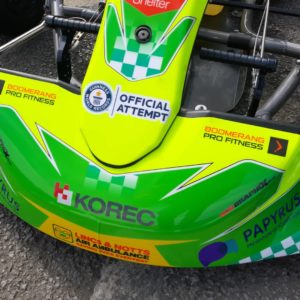
So how is Ian gearing up over these final weeks for this massive challenge?
“I’ll be focussing on building up my stamina by taking part in track days. I’m also conditioning my neck muscles, as they’ll be coping with around 70 tonnes of pressure over the 24-hour period. I’ve also upped my water intake, ensuring I am well hydrated, and getting used to a liquid diet”
(Ian won’t be consuming food during the attempt)
Whilst this is a solo attempt, Ian is far from alone. Upwards of 100 other racers will be on the circuit, with Ian hoping his kart’s bright livery will help him stand out from the crowd. He’s also got the support of the Haase UK Kart team, who have learnt him the kart, and his very understanding partner Alyona!
All of us at KOREC wish Ian the very best of luck in his challenge!
If you’d like to support Ian’s chosen charities, you can do so via his Justgiving page; https://www.justgiving.com/team/British24hoursolo
Article Links
Teesside Autodrome – British 24hr Challenge
Guinness World Records – Current World Record

